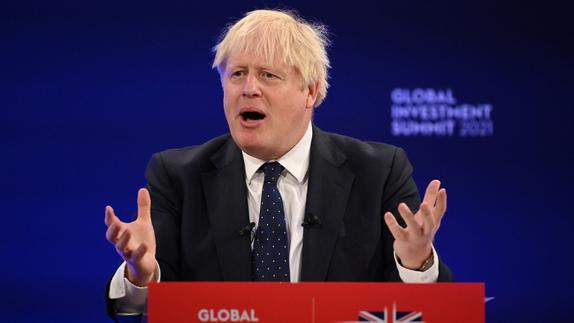 Britain's Prime Minister Boris Johnson speaks during the Global Investment Summit at the Science Museum, in London, Britain, Oct 19, 2021. (Leon Neal / Pool Photo via AP)
Britain's Prime Minister Boris Johnson speaks during the Global Investment Summit at the Science Museum, in London, Britain, Oct 19, 2021. (Leon Neal / Pool Photo via AP)
British Prime Minister Boris Johnson said the UK will not “pitchfork away” investment from China, despite differences between the two countries. Ahead of the Global Investment Summit in London on Oct 19, Johnson said China will continue to play a “gigantic part” in the British economy for many years to come.
Christopher Bovis, a professor of international business law at the University of Hull, said Johnson’s remarks “signaled a cautious return to the pre-Brexit climate of FDI (foreign direct investment) relations between the UK and China”.
The relationship between Beijing and London has soured in recent years, in part because of the differences on issues related to Hong Kong and Britain’s decision to remove Chinese companies from its 5G communications network.
“We should be cautious about how we handle our CNI (critical national infrastructure) and about how we handle FDI from China … that is why we have brought in some of the legislation that we have,” he said in an interview with Bloomberg.
The UK government has introduced legislation that makes it more difficult for foreign investors to take major stakes in critical national infrastructure because of security concerns. But the government has said Chinese companies are welcome to invest in nonstrategic parts of the British economy.
Johnson said: “I’m not going to tell you the UK government is going to pitchfork away every overture from China. China is a gigantic part of our economic life and will be for a long time — for our lifetime.”
UK imports from China amounted to 67.6 billion pounds ($93.5 billion) in the year to June, an increase of nearly 40 percent from last year, which makes China the United Kingdom’s third-largest trading partner, according to UK statistics.
Bovis said he is confident that “the power of free trade and the necessity for sectoral integration of energy markets and carbon-reduction industrial policies will be the catalyst for trade normalization between the UK and China”.
Chris Rudd, deputy vice-chancellor and head of the Singapore campus of Australia’s James Cook University, said the UK determines its stance on long-term strategic measures on whatever is likely to drag the next free trade agreement over the line.
“What is inescapable is that having set out to place maximum distance between itself and European institutions and now having failed to harvest the ‘low-hanging fruits’ of FTAs with the United States and Australia, the UK needs its remaining international friends very badly indeed,” he said.
“The UK is a staunch supporter and practitioner of free trade and China and the UK are important trade and investment partners of each other,” Foreign Ministry Spokesman Wang Wenbin said at a news briefing on Oct 19.
wangmingjie@mail.chinadailyuk.com


